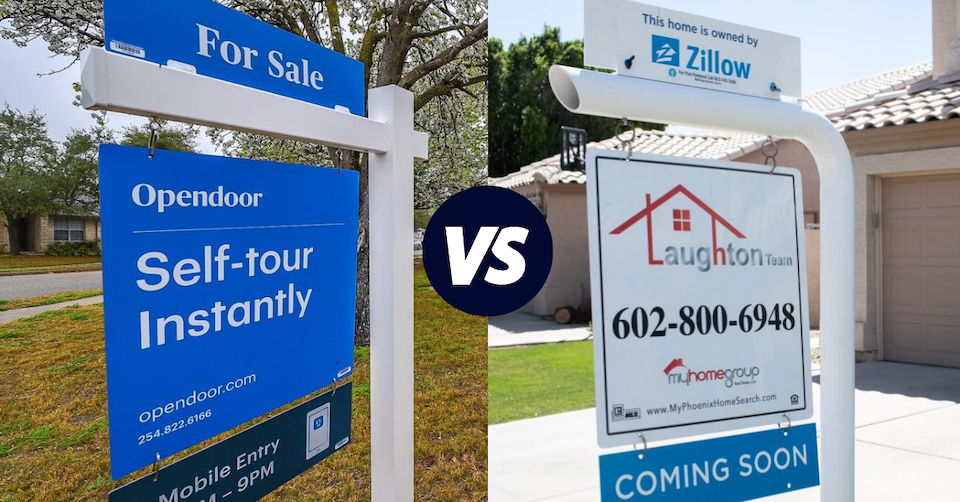Instant buyers, or iBuyers, are one of the most revolutionary changes currently being made to the residential real estate industry. The iBuying business, which emerged in 2014, uses algorithms to price homes and make instant offers in the attempt to resell for profit. These online sites have an automated, tech-first approach to real estate that make the process of selling homes simpler and therefore more appealing to sellers.
Two of the biggest names in the iBuyer scene are Opendoor and Zillow. In fact, these two popular platforms alone account for roughly 86% of iBuyer transaction volumes. Both platforms have similar buying models. They say that they can buy your home as-is within a matter of days, close on your schedule, and charge a fraction of standard commission.
While similar, both iBuyers have quite a few differences from one another. Some may even make you decide to choose over another. Let’s go over Opendoor and Zillow and discuss the difference between these two competing iBuyers.
Opendoor
Advantages: Market pioneer and fast turnaround of real estate services
Founded by Eric Wu, Opendoor was the first iBuyer on the scene acquiring $1.5 billion from investors. As the pioneers of the iBuyer industry, Opendoor is widely known for its speed. The company’s business model revolves around buying and selling as many homes as possible. This model makes for a powerful business and a smart choice for those looking for a quick home turnaround.
With Opendoor, sellers sell their home directly to them and receive an offer back in a matter of days. That way you’ll have the cash needed to buy your next home. This direct selling method also allows sellers to skip the showings and repairs. Instead, a video walkthrough is submitted and any repairs are handled by the company. This simplified selling process allows sellers to sell and move on their schedule by selecting a close date that works for them.
In addition to buying and selling services, Opendoor recently formed a brokerage and debuted cash-backed offers. The implementation of these two new services offers a huge new market opportunity that interested buyers and sellers are already advantage of. The company also has the largest home trade-in program in the nation and partnerships with many large homebuilders.
Zillow
Advantages: Strong history of pricing properties and attracting users with services
Newer to the iBuyer scene is Zillow. Up until a few years ago, Zillow was a partner in the homebuying industry. The company was originally founded back in 2006 as a real estate listing platform that generates revenue by selling real estate advertising. However, when co-founder Rich Barton returned as CEO in 2019, the company pivoted to iBuying due to competition. Since then, Zillow has invested in home tour, mortgage, and title services to make its platform even more of a one-stop shopping experience.
Like other Opendoors, Zillow makes a quick offer on homes (typically within 48 hours). Instead of having a real estate agent sell your property, you can have Zillow do it for you. This means you can skip the more expensive and time-consuming steps that go into selling.
With approximately 2.2 billion website visitors during the last quarter of 2020, Zillow knows how to draw in website traffic, as well as attact interested buyers and sellers. While Opendoor has already mastered the art of buying and selling homes, Zillow is quickly catching up. But, considering Zillow practically owns the top of the real estate funnel, it makes sense why more homebuyers are likely to use Zillow Offers for their iBuying needs. Many even suggest that Zillow will outperform Opendoor in the next 5 years.
Disadvantages of Using Opendoor and Zillow
Opendoor and Zillow share a lot of similarities and advantages to one another. Both platforms allow for quick sales that require no need for home repairs, deep cleaning, inspections, or back and forth negotiations. Sellers submit their homes information, receive an offer, and sell. While in some situations selling your home through Opendoor or Zillow might be a good choice, there are some disadvantages you will want to weigh out before you commit.
Studies have even shown that iBuyers do not present excellent value for clients and often result in offers much lower than what they'd get on the market. You're paying for convenience and speed, effectively. This is far the biggest downside of Opendoor or Zillow is the likelihood of your offer having a below-market sales price. This number is typically 15-20% below market value.
For a home valued at $350,000, you can expect to lose $70,000 in lost equity. If you’re in a time crunch, money might not be your number one concern. However, if you are like most sellers and looking to get a fair value for your home, you might want to look elsewhere.
Long story short, iBuyers aren’t always what they seem. Do your research and be aware of loopholes on their website and within their business model.
Consider Smarter Alternatives
iBuyers are in the business to make a profit. This means they'll seek to provide you with the lowest offer possible to maximize their profits. Although technology has advanced significantly, the home buying process has remained untouched.
The thought of selling quickly and efficiently through a website or app, rather than going through the conventional real estate process is appealing to many. If you are looking for an easier way to sell your home online where your best interest is always in mind, you’ll want to look at some alternatives.
The good news is that you can streamline that process - all while paying less in commissions and fees than those choosing traditional agents or iBuyers.
With SimpleShowing, sellers not only receive the benefits of a traditional agent, but you’ll also keep more money in your pockets. Instead of paying the traditional 3% listing fee, you’ll pay a reduced 1% listing fee. This percentage may sound small, but when selling a home that might be $500,000, that amount is quite significant! Plus, with self-tour lock boxes, interested buyers can tour on their own time without any involvement from you or an agent.
If you’re interested in selling your home with SimpleShowing, feel free to fill out our home evaluation form. After just a few simple questions, you'll be well on your way to selling your home and selling it smart!






